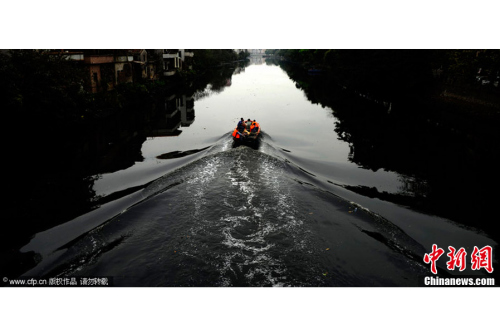
(Ecns.cn) -- You need look no further than the Qiantang River, which runs through the most developed areas of eastern China, to see that heavy industrial pollution is undermining the health of the nation.
After years of public speculation about the impact of pollution on certain areas, China has acknowledged the existence of "cancer villages" for the first time ever, reports Xinmin Weekly.
As part of that acknowledgement, the environmental ministry has said it will make efforts to guard against and control risks presented by chemicals to the environment during the 12th Five-Year Period.
"The toxic chemicals have caused many environmental emergencies linked to water and air pollution. There are even some serious cases of health and social problems like the emergence of cancer villages in individual regions," the report says.
China has 164 industrial textile clusters that are home to more than 50,000 factories, most of which are located in the country's eastern coastal area. Despite great contributions to the country's GDP, these factories have ruined rivers and lakes in the region, a problem that toxifies soil and spreads to ocean ecosystems.
A dying community
Wuli village, located along the Qiantang River, has become part of the legacy of pollution released upstream by the Nanyang Industrial Park in Hangzhou's Xiaoshan district, where more than 20 factories have been set up since 1992.
Wei Dongying, 45, has witnessed the decline. Twenty years ago, she came from Guangxi in southern China and married Shao Guantong, a Wuli resident and fisherman.
The Qiantang River used to be clean, drinkable and abundant in fish, which supported a good life for local citizens, Wei tells Xinmin Weekly.
Wei says at first, the factories discharged chemicals directly into the river, and their waste caused obvious discoloration. Underground water was also contaminated and discolored.
"It is not just the water that has been degraded, but also the air. Strong, nauseating smells like rotten fish or camphor balls assault the nose and burn the chest," Wei says. "And metal gets badly rusted because of acid fog lingering in the air."
Meanwhile, more and more factories have moved in and taken over a strip slated to become a "green belt" between the industrial park and other communities. Wei points to a chemical factory standing right next her house.
The local government has sampled groundwater and organized all the residents to get blood tests, yet the results have not been released for fear of "causing instability." It's evident now that before running water was piped into the area, villagers were drinking from thoroughly contaminated sources.
Wuli residents have petitioned against pollution since 1996, but most of them have given up hope. Wei and her husband are among the few to stick with it, becoming full-fledged environmental activists.
Life is hard for the couple, as local government support is nonexistent. The environmental bureau has dismissed their water samples, as well as photos of sewage pipes brazenly leaking into the river. The bureau has claimed that these were not adequate evidence of wrongdoing.
"Now, the sewage pipes of the factories at the industrial park have been placed deep down in the riverbed, so it is impossible to recognize the pollution that is draining into it," says Wei.
Industrial plague
Wei has compiled a list which shows that nearly 60 Wuli residents died of cancer from 1992 to 2005 in this village of only 1,000 people. Most of them died in their forties or fifties. Some didn't make it out of their twenties.
"Seven or eight residents have died of cancer every year since 2005," she says.
Blood disease is also common in Wuli. Chen Qi, 33, used to be a doctor, but now suffers from an immune system disorder. He believes it may be linked to the pollution, but hasn't got hard enough evidence for government compensation.
Yet there is little reason to doubt him. "Wuli is a 'cancer village' and dozens have died in my neighborhood," he says.
There are other villages similar to Wuli, always to be found near area industrial zones.
"Fish bred in the water has a strange taste and local residents dare not eat it," says Gao Mingliang, who lives in Sanjiang, a village next to the Binhai Industrial Zone, the largest in Zhejiang province.
Soil pollution is another problem, which is usually neglected, says Xu Qinshi, an environmental activist in Xin'er village. "Toxic sediment has a huge impact. It can make the land completely barren."
According to residents, inland rivers in Xin'er have become so poisonous that contact with the water causes rashes to break out on the skin.
Everyone's backyard
Tons of disposed wastewater from two treatment plants in the Xiaoshan Linjiang Industrial Zone and the Binhai Industrial Zone pour into the Qiantang River every day.
Shao Guantong says the wastewater is sometimes red, sometimes green, and always has a strong and terrible smell.
Greenpeace, an independent global environmental organization, investigated the wastewater and found a number of carcinogenic substances such as aromatic amine, methylene chloride, and perfluorooctanoic acid with reproductive toxicity.
These substances are normally used in the textile and chemical industries.
Local environmental authorities have said the wastewater treatment plants at the two industrial parks both comply with the country's national standards for wastewater disposal.
Wastewater cannot be as clean as water, said Zhu Haibin, vice deputy of Xiaoshan District's environmental bureau.
As this wastewater flows into the sea, marine food products bred amid pollution wind up on dinner tables in cities like Beijing and Shanghai.
If the government cannot get the pollution under control, cancer may be the fate of our generation, and even the generations to come.

Copyright ©1999-2011 Chinanews.com. All rights reserved.
Reproduction in whole or in part without permission is prohibited.